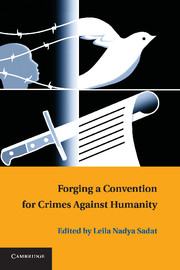Book contents
- Frontmatter
- Contents
- Figures and Maps
- Crimes Against Humanity Initiative: Steering Committee
- Biographies of Contributors
- Foreword
- Preface and Acknowledgments
- Crimes Against Humanity and the Responsibility to Protect
- 1 History of Efforts to Codify Crimes Against Humanity
- 2 The Universal Repression of Crimes Against Humanity before National Jurisdictions
- 3 Revisiting the Architecture of Crimes Against Humanity
- 4 The Bright Red Thread
- 5 Gender-Based Crimes Against Humanity
- 6 “Chapeau Elements” of Crimes Against Humanity in the Jurisprudence of the UN Ad Hoc Tribunals
- 7 The Definition of Crimes Against Humanity and the Question of a “Policy” Element
- 8 Ethnic Cleansing as Euphemism, Metaphor, Criminology, and Law
- 9 Immunities and Amnesties
- 10 Modes of Participation
- 11 Terrorism and Crimes Against Humanity
- 12 Crimes Against Humanity and the International Criminal Court
- 13 Crimes Against Humanity and the Responsibility to Protect
- 14 Re-enforcing Enforcement in a Specialized Convention on Crimes Against Humanity
- 15 Why the World Needs an International Convention on Crimes Against Humanity
- Appendices
- Testimonials and Endorsements
- Index
- References
5 - Gender-Based Crimes Against Humanity
Published online by Cambridge University Press: 01 June 2011
- Frontmatter
- Contents
- Figures and Maps
- Crimes Against Humanity Initiative: Steering Committee
- Biographies of Contributors
- Foreword
- Preface and Acknowledgments
- Crimes Against Humanity and the Responsibility to Protect
- 1 History of Efforts to Codify Crimes Against Humanity
- 2 The Universal Repression of Crimes Against Humanity before National Jurisdictions
- 3 Revisiting the Architecture of Crimes Against Humanity
- 4 The Bright Red Thread
- 5 Gender-Based Crimes Against Humanity
- 6 “Chapeau Elements” of Crimes Against Humanity in the Jurisprudence of the UN Ad Hoc Tribunals
- 7 The Definition of Crimes Against Humanity and the Question of a “Policy” Element
- 8 Ethnic Cleansing as Euphemism, Metaphor, Criminology, and Law
- 9 Immunities and Amnesties
- 10 Modes of Participation
- 11 Terrorism and Crimes Against Humanity
- 12 Crimes Against Humanity and the International Criminal Court
- 13 Crimes Against Humanity and the Responsibility to Protect
- 14 Re-enforcing Enforcement in a Specialized Convention on Crimes Against Humanity
- 15 Why the World Needs an International Convention on Crimes Against Humanity
- Appendices
- Testimonials and Endorsements
- Index
- References
Summary
Gender-based crimes against humanity are prevalent in situations of insecurity, such as armed conflict. Several gender-based crimes against humanity have been recognized in the statutes of international criminal tribunals, such as the Rome Statute of the International Criminal Court (ICC) and in the case law of these tribunals. This recognition has largely focused on crimes against humanity of sexual violence, especially rape and sexual slavery. Less developed is the recognition of the crime against humanity of gender-based persecution and other crimes that are gendered but may not contain sexual aspects. This chapter begins by examining what is meant by the term “gender” when referring to gender-based crimes against humanity. Next, the chapter explores the ways in which gender-based crimes have been reflected in current international criminal law. This section first describes legal developments related to sexual violence crimes: rape, sexual slavery, enforced prostitution, forced pregnancy, enforced sterilization, and other forms of sexual violence. Then, current international law on other gender-based crimes against humanity is considered, such as the Rome Statute's definition of gender-based persecution and the Special Court for Sierra Leone's definition of forced marriage. This paper then discusses other prohibited acts with gendered aspects, such as enslavement and torture. It concludes with recommendations for gender-based prohibited acts that should be reflected in any future crimes against humanity codification. It also raises questions that will need to be considered by drafters of a treaty codifying crimes against humanity.
- Type
- Chapter
- Information
- Forging a Convention for Crimes against Humanity , pp. 78 - 101Publisher: Cambridge University PressPrint publication year: 2011
References
- 6
- Cited by



